|
|
|
Sort Order |
|
|
|
Items / Page
|
|
|
|
|
|
|
| Srl | Item |
| 1 |
ID:
147651
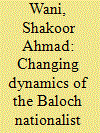

|
|
|
|
|
| Summary/Abstract |
In recent years the Baloch national movement has undergone a sea change. The dismantling of rudimentary representative institutions by the military regime of Pakistan’s president, General Pervez Musharraf, set off a process of radicalization of Baloch nationalism. The excessive reliance on a coercive state apparatus has not only alienated the moderate nationalists but also increased the popularity of a separatist creed. This article argues that aggressive resource exploitation and state repression is pushing Balochs toward secession.
|
|
|
|
|
|
|
|
|
|
|
|
|
|
|
|
| 2 |
ID:
176384
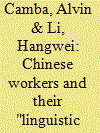

|
|
|
| 3 |
ID:
148274
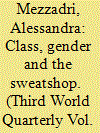

|
|
|
|
|
| Summary/Abstract |
Drawing on approaches to class emphasising the multiplicity of labour relations at work under capitalism, and from feminist insights on oppression and social reproduction, this paper illustrates the interconnection between processes of class formation and patriarchal norms in globalised production circuits. The analysis emphasises the nexus between the commodification and exploitation of women’s labour, and how it structures gendered wage differentials, labour control and the high ‘disposability’ of women’s work. The analysis develops these arguments by exploring the case of the Indian garment industry and its gendered sweatshop regime. It illustrates how commodification and exploitation interplay in factory and home-based realms, and discusses how an approach on class premised on social reproduction changes the social perimeters of what we understand as labour ‘unfreedom’ and labour struggles.
|
|
|
|
|
|
|
|
|
|
|
|
|
|
|
|
| 4 |
ID:
085053


|
|
|
| 5 |
ID:
180692


|
|
|
|
|
| Summary/Abstract |
Lately the African continent has been the focus of global attention and discussions on the present and future of Africa, especially with regards to the highly topical questions concerning the global and African state of peace and security. As multiple extremely complex armed conflicts continue to cause chronic instability and vulnerabilities in several African states and regions, they also directly affect the state of international security in the 21st century in an intensively interconnected and globalized world from an economic, political and peace/security perspective. Accordingly, this research article offers an in-depth analysis of some of the major causes and explanations of the existing wars in Africa related to the illicit exploitation of resources, vulnerability, and control. The goal of this work is to reveal and analyze the complexity of 21st-century wars in Africa and their deep interrelated causes by applying the example of the long and banal armed conflicts in the Democratic Republic of the Congo. Thus, the authors argue that the destabilization of the political and socio-economic situation in Africa, and DRC in particular, is directly connected to local and regional conflicts over access to various forms of resources, influence, and power, but also to the artificially created chaos by various interested power parties for expansion, profit, and hope for further profit. In this sense, it has been emphasized that conflicts of so-called ‘low intensity’, artificially maintained over a long period of time, pose no lesser degree of threat to the regional state of peace and security.
|
|
|
|
|
|
|
|
|
|
|
|
|
|
|
|
| 6 |
ID:
146570


|
|
|
| 7 |
ID:
139431
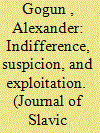

|
|
|
|
|
| Summary/Abstract |
This article discusses the general relationship between Soviet partisans and the Shoah in Ukraine. This topic also touches upon the issue of the involvement of Jews in Soviet paramilitary, reconnaissance, sabotage and terrorist military units that were operating behind the Wehrmacht front lines. To a lesser extent, the context of these events is shown; in particular, the moods of the population on the occupied territories are described.
|
|
|
|
|
|
|
|
|
|
|
|
|
|
|
|
| 8 |
ID:
156800
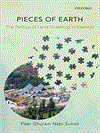

|
|
|
|
|
| Publication |
New Delhi, Oxford University Press, 2018.
|
| Description |
xv, 194p.: tables, maps, figureshbk
|
| Standard Number |
9780199477616
|
|
|
|
|
|
|
|
|
|
|
|
Copies: C:1/I:0,R:0,Q:0
Circulation
| Accession# | Call# | Current Location | Status | Policy | Location |
| 059256 | 352.54/SUH 059256 | Main | On Shelf | General | |
|
|
|
|
| 9 |
ID:
136301
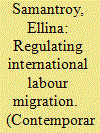

|
|
|
|
|
| Summary/Abstract |
Regulating international labour migration has been at the core of policy concerns in many countries of the world. The increasing movement of people from countries of origin to destination for employment has led to corresponding issues of trafficking of women, exploitation by recruitment agencies and violation of migrant rights. In this context, this present paper explores the problems of migrant workers exploited through recruitment agencies and the nature of exploitation and atrocities perpetrated on them. It also tries to understand the role of migration policies and migration management and regulation. Overall, the paper contextualizes international migration and the role played by recruitment agencies vis-à-vis Private Employment Agencies Convention 1997 (No. 181) adopted by the International Labour Organization.
|
|
|
|
|
|
|
|
|
|
|
|
|
|
|
|
| 10 |
ID:
150015
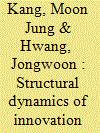

|
|
|
|
|
| Summary/Abstract |
Innovation in the renewable energy (RE) sector relies on the concept of systemic innovation, which requires interaction between two innovation aspects: technology exploration and market exploitation. The European Union (EU) has introduced political instruments for systemic RE innovation by integrating resources from different thematic and geographic areas. However, using these instruments to establish an ecosystem for systemic innovation remains unexplored. This study develops a framework for evaluating the systemic innovation performance of networks through a time-series analysis of network structural properties. Overall, EU-funded innovation networks have not evolved in a systemic direction. First, the network exhibits densely connected local clusters for technology exploration and market exploitation of RE innovation, which are disconnected from each other. Over time, the gap between the two phases has weakened with increasing connectivity, but the local clusters supporting either explorative or exploitative activities have diminished. The existing networking linkages among organizations are considered ineffective because their positions in the network tend to display a mismatch with their innovation patterns. This research presents policy suggestions for optimizing the exploration and exploitation activities in the EU's funding program and their complementarities to establish a systemic innovation environment in the RE sector.
|
|
|
|
|
|
|
|
|
|
|
|
|
|
|
|
| 11 |
ID:
189546
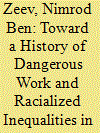

|
|
|
|
|
| Summary/Abstract |
In recent years, a high number of fatal work accidents in the construction industry in Palestine/Israel has led several Israeli civil society organizations to begin documenting and publicizing the details of work accidents and identities of the victims. This novel documentation work has laid bare the unequal racialized distribution of dangerous work and bodily harm in the land. Palestinian construction workers from across the Green Line consistently constitute the overwhelming majority of victims of construction accidents, followed by migrant workers. Considering the long history of racial divisions of labor in Israel/Palestine over the last century, and building on the insights of scholarship on disability and political economy, this essay argues for the historical study of dangerous work as a crucial field of inquiry for scholars seeking to understand inequality, exploitation, the production of difference, settler colonialism, and communities’ experiences of these phenomena and processes in Palestine/Israel since the early twentieth century.
|
|
|
|
|
|
|
|
|
|
|
|
|
|
|
|
| 12 |
ID:
148271
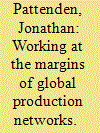

|
|
|
|
|
| Summary/Abstract |
This article analyses why informal labourers working ‘at the margins’ of global production networks lack ‘structural’ and ‘associational’ power. It does so in order to better understand potential changes in their material and political conditions, and as part of broader calls to put labour at the centre of development studies. The article focuses on rural-based labourers in south India who work relatively invisibly as agricultural labourers and informal factory workers, and on the construction sites of a ‘global city’ (Bangalore). It deploys a three-way labour control regime framework that encompasses (1) the macro-labour control regime, which is ultimately defined by capitalist relations of production, and characterised in India by particularly high levels of informality (precarious and largely unregulated work) and segmentation (due to the fragmentary impact of caste); (2) the local labour control regime, which refers to how class relations in specific places are shaped by patterns of accumulation and work (themselves shaped by differences in agro-ecology, irrigation, and remoteness from non-agricultural labour markets), distributions of classes and castes, and the uneven presence of the state; and (3) the labour process, which is increasingly marked by forms of ‘remote control’ marshalled by labour intermediaries. Debate on the macro-labour control regime and on the labour process is well established, but little has been said about local labour control regimes, which are newly defined here and discussed in terms of differences between ‘wetland/circulation zones’ and ‘dryland/commuting zones’. The article identifies locations where labour has greater potential structural and associational power. Increased worker organisation in these areas could have knock-on effects in more ‘obscure’ sites.
|
|
|
|
|
|
|
|
|
|
|
|
|
|
|
|
|
|
|
|
|